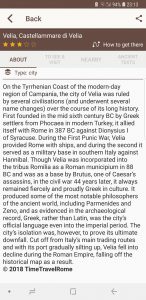After the assassination of Caesar, there was a breakdown of law and order and Cicero had left Rome. However he then received news that encouraged him to return. Upon his return he delivered the series of speeches reviling Mark Anthony, (confusingly called the Philippics, in reference to a similar series of speeches at Athens by Demosthenes against Philip of Macedon.) It was Cicero’s final moment of glory as the Republicans rallied around him.
However, Anthony and Octavian (the future Augustus) prevailed in the end and Cicero’s name was at the top of the hit-list of those proscribed. He fled Rome but was tracked down and killed soon after.
They added besides, (for it is a very common thing for those who are desirous of bringing good news to invent something to make the news which they bring seem more joyful,) that parties were coming to an agreement; that the senate was to meet on the first of August; that Antonius having discarded all evil counsellors, and having given up the provinces of Gaul, was about to return to submission to the authority of the senate.
Then truly I was inflamed with such eagerness to return, that no oars or winds could do enough for me; not that I thought that I should not arrive in time, but in case I should be later than I wished in congratulating the republic; and I quickly arrived at Velia, where I saw Brutus: with how much grief, I cannot express. For it seemed to be a discreditable thing for me myself, that I should dare to return into that city from which Brutus was departing, and that I should be willing to live safely in a place where he could not. But I saw that he himself was not agitated in the same manner that I was; for, being elevated with the consciousness of his great and glorious exploit, he had no complaints to make of what had befallen him, though he lamented your fate exceedingly.
addebant praeterea—fit enim plerumque ut ei qui boni quid volunt adferre adfingant aliquid quo faciant id quod nuntiant laetius—rem conventuram: Kalendis senatum frequentem fore; Antonium, repudiatis malis suasoribus, remissis provinciis Galliis, ad auctoritatem senatus esse rediturum.
tum vero tanta sum cupiditate incensus ad reditum ut mihi nulli neque remi neque venti satis facerent, non quo me ad tempus occursurum non putarem, sed ne tardius quam cuperem rei publicae gratularer. atque ego celeriter Veliam devectus Brutum vidi: quanto meo dolore non dico. turpe mihi ipsi videbatur in eam urbem me audere reverti ex qua Brutus cederet, et ibi velle tuto esse ubi ille non posset. neque vero illum similiter atque ipse eram commotum esse vidi. erectus enim maximi ac pulcherrimi facti sui conscientia nihil de suo casu, multa de vestro querebatur.
Text and translation (lightly adapted to make it more literal) are both taken from the Perseus Digital Library 
When Cicero returned to Italy he met Brutus at the port of Velia in Campania. This city was originally Greek, founded in 540BC and called Elea. It was the home of the Eleatic philosophers, notably Parmenides.
You can find out more about Velia (modern Castellammare de Velia) and also explore other references to this place in ancient texts with the TimeTravel-Rome app. : https://timetravelrome.com/
The Greek theatre at Velia


No Comments